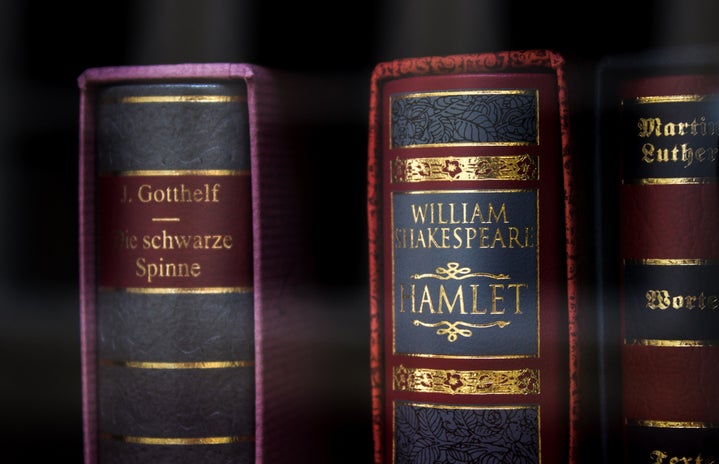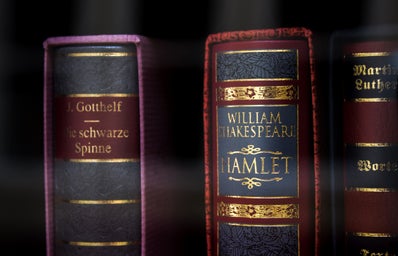The world’s a stage,
And all the men and women merely players,
They have their exits and entrances, All
And one man in his time plays many parts,
His acts being seven ages.
These lines spring from William Shakespeare’s famous play As You Like It, and these renowned words speak about life being a stage and compare the various phases of life to plays, once again reminding us of the significance of life. This play was written in the 1600s, nonetheless, it has withstood the test of time and still has not ceased to thrive. The same goes for the rest 40 works of Shakespeare and as Ben Johnson said, “He (Shakespeare) was not of an age, but for all time“.
From theatre stages to art exhibitions, Shakespeare’s works are still used in myriad forms. Many of his plays have been adapted into films, some of which have become classics in their own right. Examples include Romeo and Juliet (1968), Hamlet (1996), and Macbeth (2015). Shakespeare’s works have inspired countless literary adaptations, including novels, short stories, and poetry, and also numerous artists, including painters, sculptors, and photographers. Even today, Shakespeare’s plays are frequently studied in literature classes, and his works have been analyzed and interpreted by scholars for centuries.
Overall, Shakespeare’s works have had a profound impact on the world of literature and arts, and his influence continues to be felt today in countless forms. This enduring legacy finds its origins back in the Elizabethan age when a 30-something young man started using his skills with words to create literary texts and craft complex characters and intricate plots. His themes and characters speak about universal human experiences that are still relevant today. Shakespeare’s works cover a broad range of themes and genres, from romantic comedies to historical dramas to tragedies. Moreover, his use of language and poetry is unparalleled. He had a gift for turning everyday words and phrases into beautiful, poetic language that has captivated audiences for centuries. His works continue to be celebrated and studied today because of their enduring relevance and timeless appeal.
As we talk about the present times, in the 21st century, the young generation finds indulging in the works of Shakespeare irrelevant. The reason might be because the texts he wrote over 400 years back, could be difficult for people today to comprehend. Many also view the themes in his works as outdated and not relevant to their lives. Rather than literature from the Elizabethan times, the young generation wants to wallow in contemporary literary texts.
Despite the apathy shown by 21st-century mankind, towards the works of Shakespeare, little do they realize that some or the other way Shakespeare surrounds them, especially as they speak English. It is commonplace for us today to inadvertently use phrases and words which have stemmed out of the works of Shakespeare, and as the well-known English actor and Opera artist, Christopher Gaze says, “Shakespeare is well and alive today, and most of us are unaware that we have been quoting Shakespeare all day”. When we don’t recall something and say that ‘It’s Greek to me’ we are ‘quoting Shakespeare’. If your property has vanished into thin air, if you are suffering from green-eyed jealousy because of your colleague and when you find your friend as your tower of strength, you are quoting Shakespeare. To sum it up, the Bard of Avon has left no stone unturned when it comes to profoundly influencing English literature and vocabulary.
Doug Scholz-Carlson, the Artistic Director of the Great River Shakespeare Festival in Winona, believes that we have found a new way to communicate because of Shakespeare, he says so by telling us a little anecdote that goes like this – An actor from Los Angeles walks into a working class bar in the Midwest and strikes up a conversation with two factory workers. The intellectual urban elite meets a middle class American on a barstool. What happens in this case, is that our actor convinces the two factory workers to come see The Winter’s Tale at the Great River Shakespeare Festival. The very next night in the bar, they talk about jealousy, what it feels like when you’re jealous of your wife, how you get stuck in that feeling, and how you get back out.
Looked at from the outside these three men appear to have nothing in common and yet here they are, having an intimate conversation, they’re discovering each other’s humanity and they are learning about themselves from an unexpected source which turns out to be, encountering a great work of art, like a play by William Shakespeare.
If we stop paying heed to literary texts like Shakespeare, we risk losing valuable insights into human nature, history, and culture, as his works offer a window into the social and political issues of his time, such as power, gender, and class. Furthermore, literary texts like Shakespeare’s plays are important because they help us to develop critical thinking, empathy, and cultural understanding and expand our understanding of human experiences. In summary, being neglectful of literary texts like Shakespeare’s would result in a loss of valuable cultural, historical, and literary knowledge, as well as a lack of appreciation for the artistic and intellectual achievements of previous generations.


